The QB GOAT Series: 5-4
Two quarterbacks who broke several records, though one with questions about system label, and the other without playoff success
I don’t agree 100% with all the rankings, but the beauty of stats-based analysis is that we can take representative data from nearly one million quarterback dropbacks over a century of the modern NFL to rank-order quarterbacks by value. Good luck watching, grading and comparing every quarterback snap from 1947 to 2022 and then forming your own film-watcher list.
I’m going to take this list in smallish chucks, going three-at-a-time until I get to the final few, who you might be able to guess, though the ordering may remain a mystery.
Links to past posts:
No. 5: DREW BREES
Regular: 3rd, Peak: 9th, Playoffs: 18th
I’ll say right off the bat that this ranking is probably too high. Brees is going to get passed by Aaron Rodgers (No. 6) this season, and Patrick Mahomes (No. 11) is also, surprisingly, not that far away. Other big factors in Brees’ overvaluation are his advantages in weather and opponent defensive strength, or lack thereof.
Brees played half of his games at home in the dome, and also played in a division with another dome (Atlanta), and two year-round good weather locations (Tampa Bay and Charlotte). That’s 11 games locked in every year nearly always without weather issues, as many as any quarterback in the NFL - or tied with Matt Ryan (No. 28) for all those years. Brees’ NFC South opposing defenses ranked in the top-10 for opponent dropback EPA roughly 20% of the time, and in the bottom-10 more than 40% of seasons.
Because of his contextual advantages, and massive volume playing mostly with a poor defense himself, Brees is a mix of a system quarterback/compiler and elite player. I wouldn’t have him a top-5 quarterback of all-time, but probably would have in the top-12, higher than many historical observers. I think coaching is one of the hardest factors to weigh without granular, objective evidence. That said, it’s hard to postulate that Brees lacked coaching benefits playing all those years with Sean Payton.
Brees also has contextual factors going against him, including never winning MVP, despite being first or second in ANY/A six times. Brees was the First-Team All-Pro selection at quarterback in 2006, finishing a distant second to LaDainian Tomlinson in MVP voting. Brees was recognized as the second-best quarterback in the NFL four times, earning Second-Team All-Pro selections in 2008, 2009, 2011 and 2018. In those years, Brees finished below all-time greats Peyton Manning (2x), Aaron Rodgers and Patrick Mahomes. In another quarterback era, someone with Brees’ relative-to-NFL production could have won several MVPs.
In an era of great quarterbacks, Brees was the dominant thrower for volume and accuracy, leading the NFL in completions six times, yards seven times, touchdowns four times and completion percentage six times. Brees limited mistakes, with an excellent 2.3% career interceptions rate (below 2.0% eight of his last 10 seasons) and 3.8% sack rate (led the NFL three times).
It hard to argue Brees had extraordinary receiver talent throughout his career, or that his efficiency suffered at all when a strong receiver left. Brees top career target was Marques Colston, a former UDFA who never even made the Pro Bowl, and he was as efficient throwing to Pierre Thomas (6.7 yards per target) as Alvin Kamara (6.8). At this point, it’s hard to tell if Michael Thomas was truly the Offensive Player of the Year talent we saw in 2019, or more a product of the Brees/Payton system. The receiver I’m most confident was a top-notch talent for Brees was Jimmy Graham, who helped Brees hit 40-plus touchdowns the only two times of his career. Even then, Brees’ post-2014 efficiency without Graham didn’t miss a beat.
With 10 playoff appearances, it’s hard to argue that Brees wasn’t given a chance to accumulate stats in the postseason, but it’s probably light with him posting top-10 ANY/A on high volume for 14 seasons, with another three seasons in the top half of the NFL. Brees wasn’t poor in the playoffs, with an average 7.0 ANY/A over 18 games, and the Saints winning exactly half. The Saints’ Super Bowl run in the 2009 postseason was one of Brees’ best in efficiency (8.4 ANY/A), but with lower volume (240 passing yards per game). The 2011 postseason is probably my favorite for Brees, passing an insane 106 times over two games, throwing seven touchdowns, two interceptions and averaging 464 yards per game. In his time with the Saints, Brees’ eight playoff losses came in games that his defense gave up 41, 39, 36, 30, 29, 26, 26, and 23 points.
There’s competition for Brees’ most heart-wrenching playoff loss, including throwing 60 times for 404 yards and losing 41-36 in the infamous “Beastquake” game, played in Seattle due to their division title at 7-9 to the Saints 11-5 record. Add to that back-to-back-to-back crushing losses with the Minneapolis Miracle in the 2017 postseason, the egregious blown pass interference non-call keeping them out of the Super Bowl in 2018 and an overtime loss to the Vikings in 2019.
No. 4: DAN MARINO
Regular: 4th, Peak: 3rd, Playoffs: 22nd
Keep reading with a 7-day free trial
Subscribe to Unexpected Points to keep reading this post and get 7 days of free access to the full post archives.







